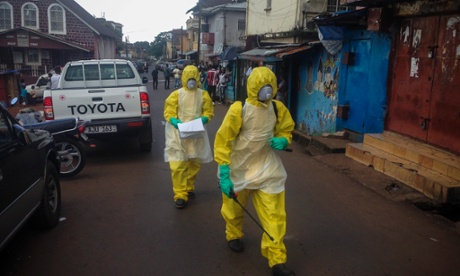AMA head Brian Owler says apparently 16 Australian health care workers have been trained to go to west Africa, but he has no idea who they are

Australia’s response to Ebola has been a shambles, says the head of the country’s medical association who’s calling on the government to develop and announce a plan to help deal with the crisis.
Apparently 16 health care workers have been trained to go to west Africa and do “dangerous work” with Ebola patients, Australian Medical Association president Brian Owler said.
But neither the AMA nor the chief medical officer know who the people are, what sort of training they’ve had and whether they’re properly prepared.
“It’s not the Ausmat [Australian Medical Assistance] teams that you would expect would be trained to do this work,” Owler told reporters in Sydney.
“Who are these people? If anything is going to be irresponsible it would be a last minute announcement about people who are ill-equipped or ill-trained to go and do this dangerous work”.
He’s called on the government to announce what it is going to do to help tackle the “humanitarian crisis” overseas and what the plans are if a potentially infected person arrives in Australian.
And Owler has “big questions” about mandatory quarantines at airports for people returning from affected areas, like those to be set up in the US.
He said the nurse in Cairns, who had quarantined herself after showing signs of fever, had followed the right procedures by avoiding contact with others and alerting authorities.
“People should be reassured that the risk of transmission of that infection is very, very, low, but obviously it is a concern,” he said.
Opposition leader Bill Shorten has also accused prime minister Tony Abbott of not doing “enough to deal with this crisis”.
“Logic dictates that you’re better off dealing with the outbreak of a deadly and serious contagion closer to the source than waiting until it comes to Australia or comes to Papua New Guinea,” he said.
“If you want to deal with a contagion and a disease which is deadly and spreads very rapidly, you’re better off dealing with it early.”
The US and UK asked for assistance from Australia a month ago, Owler said.
The British are sending 750 people to help in Sierra Leone while the US has dispatched more than 3,000 to Liberia.
“While we drag our feet on this issue, while the government continues to roll out the tired old excuses about why we can’t respond, unfortunately people are going to continue to die,” he said.
The World Health Organisation last week estimated that unless 70% of infected people were treated in the next two months, there will be 10,000 new cases each week, affecting potentially 1.4m west Africans.
